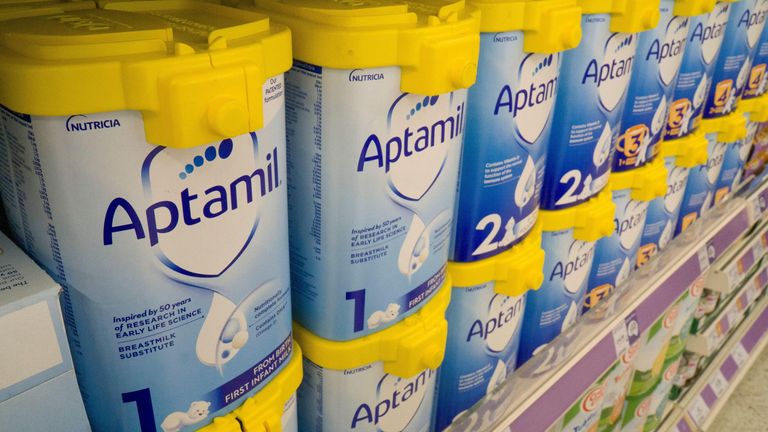Baby formula market not working for parents, says watchdog


The baby formula market needs a shake-up to help parents struggling to afford it, according to the UK’s competition watchdog.
There are “limited incentives” for the industry to compete on price and parents have suffered the consequences of high prices, said an interim report by the Competition and Markets Authority (CMA).
The watchdog has previously reported a 25% increase in prices over the past two years, with just two companies, Nestle and Danone, controlling 85% of the market.
Among its recommendations is a call for better public health messaging and clarity for parents trying to choose between different brands.
The CMA also confirmed it is examining the effect a price cap would have, but said it is not currently recommending one.
The report said: “The CMA has provisionally found that – unlike in many other grocery categories – there is little pressure on manufacturers or retailers to shelter customers from increases in manufacturing costs, which have largely been passed on quickly and in full.”
Please use Chrome browser for a more accessible video player
3:00
The baby formula market needs to be shaken up, watchdog warns
Sarah Cardell, the CMA’s chief executive, said: “This is a very important and unique market.
“We’re concerned that companies don’t compete strongly on price and many parents – who may be choosing infant formula in vulnerable circumstances and without clear information – opt for more expensive products, equating higher costs with better quality for their baby.
“We have identified options for change, but now want to work closely with governments in all parts of the UK, as well as other stakeholders, as we develop our final recommendations.”
Advertisement
The CMA expects to publish a final report in February. Earlier this year, the regulator announced that it would inspect baby formula prices amid concerns that they remain “historically high.”
Its decision to launch a market study gave it the authority to require suppliers to disclose detailed information on pricing and other practices.

Previously, the CMA relied on voluntary submissions from suppliers.
In 2023, the World Health Organization (WHO) urged governments to act over soaring baby formula prices, which it said was “exploiting” families in the UK.
In an interview with Sky News, WHO criticised multinational manufacturers for “manipulating prices” to boost profits on baby formula.
Research at the time showed that formula prices in the UK had risen by 24% over the previous two years, with the lowest-cost brands seeing a 45% increase during that period.
WHO is calling on governments to step in and help ease the burden on struggling families by finding ways to lower prices in stores.
Sky News has previously reported on the extreme measures some parents are taking to feed their infants, including stealing formula, purchasing it on the black market, diluting bottles, or using condensed milk as a substitute. Former prime minister Rishi Sunak described the situation as “sad” at the time.
Laurence Grummer-Strawn, WHO technical officer, told Sky News, “It’s shocking to see a high-income country like the UK facing situations where mothers can’t afford to feed their babies.”
When asked if this situation constituted exploitation, Grummer-Strawn said: “Yes, I think we can say that when you see that these prices are being driven down to the consumers and having to pay extremely high prices.”
The group’s call for government action over “exploitative” formula milk prices “cannot be ignored”, Alison Thewliss, an SNP MP and chair of the all-party parliamentary group on infant feeding, told Sky News at the time.
The Glasgow Central MP raised the dangers of high formula prices in the House of Commons the day after the interview.
Ms Thewliss said the situation was “an absolute catastrophe for those who rely on infant formula but a bonanza for the formula companies who are making significant profits out of this”.
You can receive breaking news alerts on a smartphone or tablet via the Sky News app. You can also follow @SkyNews on X or subscribe to our YouTube channel to keep up with the latest news.